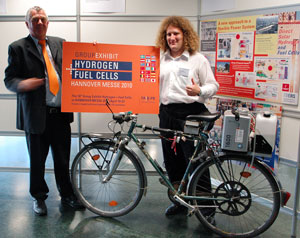Lucerne, Switzerland, was again worth a visit
The European FUEL CELL FORUM 2009 took place in early July in Lucerne, Switzerland. As in previous years, it was successfully organized by Dr. Ulf Bossel `s European Fuel Cell Forum. The approx. 150 international conference attendees were able to listen to 82 oral Presentations and to see 52 Poster Presentations on "Fundamentals, Materials, Systems and Applications". For me, it was interesting to follow the presentation of Dr. Karl Föger - Chief Technology Officer of the company Ceramic Fuel Cells Limited., (CFCL), based in Noble Park, Australia. Also during the poster session, I could learn a lot. A fuel cell-powered bike in the practical application was presented by Dipl-.Ing. Jörg Weigl from University Teknologi Malaysia, Kuala Lumpur, Singapore, in Lucerne.

Joerg Weigl and Arno A. Evers at the FUEL CELL FORUM 2009 . Photo: Britta Bossel, EFCF, Meggen, LU, Switzerland |
Presentation by Dr. Charles Föger, CTO, Ceramic Fuel Cells Ltd, Australia Dr. Föger explained in his keynote presentation, the overall market environment for residential areas of application of fuel cell systems. So in Japan, there would be a demonstration program for / with 3,000 PEM fuel cell systems in the years 2005 to 2008. The German CALLUX project foresees a total of 800 stationary fuel cell installations from 2009 to 2015 and the European Hydrogen and Fuel Cell Initiative JTIs plans until 2013 to invest 138 million in these technologies.
Ceramic Fuel Cells Limited., (CFCL) focuses on the development and demonstration of "residential mini power stations", based on solid oxide fuel cell technology (SOFC). Since 2004, CFCL have carried oud field tests in six countries at 14 locations and have clocked over 110,000 field test operating hours. Fuel cells, in particular those with high operating temperatures as SOFC systems, as explained Dr. Föger, are distingueshed from other micro-CHP (CHP) technologies such as internal combustion engines, through their potential for very high electrical efficiency. „...CFCL sees this as a key product advantage and pursuit of high electrical efficiency becames a guiding principle of CFCL`s product development...", said Dr. Föger.
In February 2009, CFCL demonstrated a "world record" system electrical efficiency of 60% net AC (LHV)in its 2kW prototype fueld with Natuaral Gas based on its Gennex fuel cell module. To achieve this goal, so Dr. Föger, "... we developed innovations and optimizations of the individual cell to the entire system and its control. Low internal resistance, and high activity for internal reforming, very good utilization of the fuel and a re-optimized power management of the system were important steps towards our goal ... "
In the future commercialization CFCL is adopting a dual approach: first with the launch of an integrated micro-CHP - product with partners in Europe and Japan, and secondly with a 2kW residential generator "BlueGen" with the option of heat recovery. Further developments will improve long term stability and to lead to further cost reductions. Dr. Föger concluded his presentation: "... CFCl is ready for initial product roll-out. To support commercialisation, we are in the construction phase for a first volume manufactoring plants for fuel cell modules with an initial production capacity of 10,000 modules per year in Heinsberg in Germany! "
That's sonds good and makes me optimistic.
The fuel cell-powered bicycle by Jörg Weigl
Dipl-.Ing. Jörg Weigl from University Teknologi, Kuala Lumpur in Malaysia gave a paper on the topic: "PIOs Fuel Cell Motorcycle: Endurance Test of Polymer Electrolyte Fuel Cell Drive“. In addition, he also brought a functioning bike to the conference. This fuel cell-powered bicycle by Jörg Weigl, he had assembled on the Sunday before the start of the conference. Because of the loss of his prototype bike in Kuala Lumpur, shortly before his departure to Europe Jörg drove a "crash program". He quickly built, together with his "saved" Ecofys fuel cell module "... in a few hours" a modified fuel cell driven bike in Germany. To get the torque to the rear axle, he used existing components, such as a high-performance battery and power electronics. A self made motor, designed by Ernst Dilger: LRK Motor (24pol, 200W), 3phase AC permanent magnet Motor outrunner was integrated. Served as a throttle lever was a small potentiometer on the handlebars, right next to the conventional brake levers. The ramp-up time to the running mode in Lucerne was max.15 minutes after switching on.
Some congress participants convinced themselves of the proper handling of the bike in several tests on the sidelines of the conference on the station forecourt of the city on Vierwaldstätter lake. Our photos give a glimpse on the bike, they show the compactness and robustness of the vehicle. This result is only possible through years of practical H2/FC-Experience by Jörg Weigel. Already at the Hanover Fair 2003 he presented his thesis: "The PIOs - hydrogen - cycle, a fuel cell powered electric bicycle" and was surprising and exiting fair visitors, VIP `s, and media representatives, His current doctoral thesis Jörg Fuel now writes in cooperation with the Cell Vehicle Team at the University Teknologi, Kuala Lumpur, Malaysia. From this type of experts, I wish me more. I spontaneously invited Jörg on become exhibitor at the Group Exhibit hydrogen and fuel cells at the Hanover Fair 2010 from 19-23 April. Let us once again become surprised and excited.
The European FUEL CELL FORUM 2010 with the 9th European SOFC Forum will take place
28. June to July 2, 2010 at the Culture and Congress Center Lucerne, Switzerland.
Caption: Joerg Weigl and Arno A. Evers at the FUEL CELL FORUM 2009 . Photo: Britta Bossel, EFCF, Meggen, LU, Switzerland
Links to the news:
Date: 07.07.2009 |
